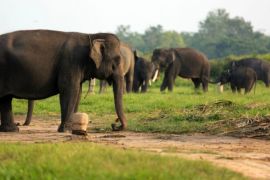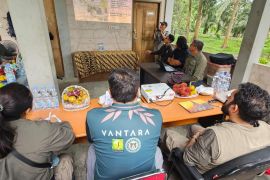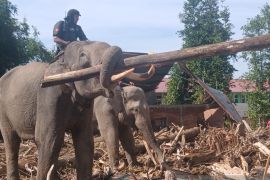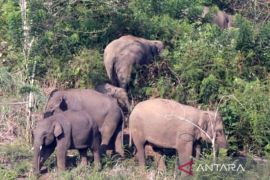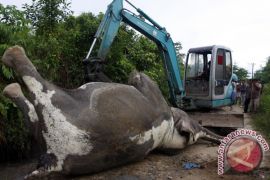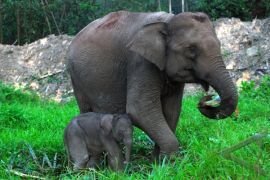Their ability to seek a proper solution to the human-wildlife conflicts (HWCs) is needed as the conflicts have resulted in human and material losses and deaths of many endangered animals in affected regions.
The HWC-related occurrences are closely related to the damaged condition of the wildlife's natural habitat. Therefore, the issue is quite relevant to what the vice presidential candidates will debate on January 21, 2024.
In their second round of debate, they will focus on sustainable development, natural resources, environment, energy, food, customary law communities, and villages.
The HWCs frequently occur in such regions as Riau, North Sumatra, and Aceh Provinces.
In Aceh, the Indonesian Forum for the Environment (Walhi) recorded 113 HWC-related occurrences between 2019 and 2023, including 33 involving Sumatran elephants.
The conflicts had resulted in the deaths of 22 Sumatran elephants, according to Walhi-Aceh Chapter Head Ahmad Shalihin's statement, published on the conservation group's website that ANTARA quoted on Sunday.
Meanwhile, Indira Nurul Qomariah's study (2018) revealed that the human-elephant conflicts in Aceh are triggered by deforestation despite the mammals' vital role in preserving the forest and its ecosystem.
The number of dead elephants was higher prior to 2019-2023, as the Aceh Natural Resources Conservation Agency (BKSDA) reported that between 2012 and 2017, 68 elephants were found dead (Qomariah, 2018).
Fifty-five of them died as a result of the HWCs. The agency also reported human casualties owing to the human-elephant conflicts.
The agency noted that 11 people sustained injuries, and eight others were killed during the 2012-2017 period, Qomariah disclosed in her scientific article published by the World Resources Institute (WRI) Indonesia (2018).
Pidie's fatality
This year, a ranger from Leupu Village in Geumpang Subdistrict, Pidie District fell victim to a rogue elephant when attempting to keep a herd of wild elephants away from locals' farmland on Nov 26.
Nurman bin Cut died on Dec 8 after being hospitalized since the day he was thrown to the ground by the angry mammal when attempting to drive the wild elephants back into the village's forest.
Herds of wild Sumatran elephants have often been sighted wandering through residential areas in several Aceh's regions.
In early December 2023, for instance, a herd of 25 wild elephants wandered through a populated area in Bener Meriah District.
Along with local residents, Central Aceh's Flora and Fauna Safeguarding Team (TPFF) members kept them away from the residential area. They drove them back into the protected forest of the Genengan area.
The coordinator of the Karang Ampar-Bergang TPFF, Muslim, informed that the protected forest belongs to the Sumatran elephant corridor, which covers the districts of Central Aceh, Bener Meriah, Bireuen, and Pidie Jaya.
The wild Sumatran elephants damaged the residents' houses and food barns. As a result, Muslim says, they did not only suffer material losses.
They also lived in fear as they repeatedly spotted the wild elephants wandering inside their residential area.
Muslim further noted that human-elephant conflicts have occurred since 2002, but the situation has worsened over the past ten years owing to damage to the habitats of the Sumatran elephants.
The granting of the right to cultivate (HGU) to many parties in Bireuen district, Aceh province, for instance, has contributed to such damage. As a result, wild elephants are finding their way to get food.
"I am a farmer who depends on the forest for a living. So, I do know where the areas of the elephant corridor are," Muslim said.
The granting of the right to cultivate to many parties in Bireuen has led to the disappearance of elephants' habitat in the district. It triggers the elephant herds moving to Central Aceh and Bener Meriah Districts, he informed.
To end the ongoing human-elephant conflict, he highlighted the importance of creating an essential ecosystem area or a grand forest park covering 10 thousand hectares of land in Central Aceh, Bener Meriah, and Bireuen districts.
Related news: Ensure environmental sustainability in building public infrastructure
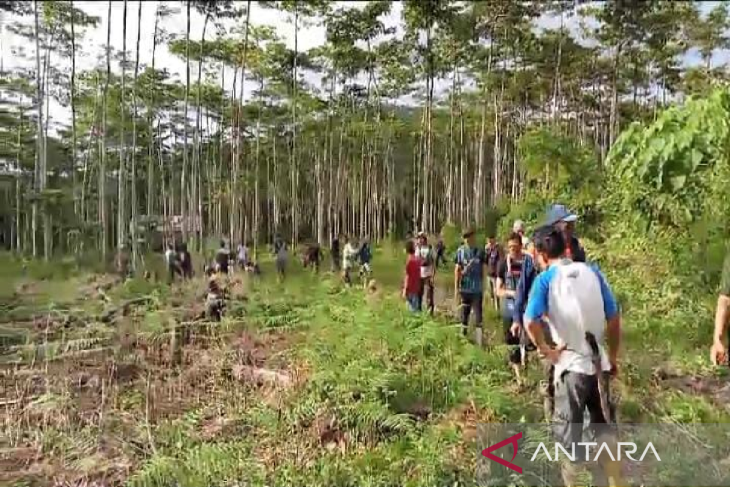
Deforestation and crackdown
Deforestation has indeed contributed to the destruction of wild Sumatran elephants' natural habitat in Aceh.
However, several other factors that could also threaten the present and future existence of the wild Sumatran elephants, such as an increase in human population, changing climate and land use, elephant poaching, and ivory trade, need also be addressed.
Mukeka, Ogutu, Kanga, and Roskaft's research (2019) showed how changing land use and climate contribute to the HWCs.
They argued that conflicts occur most intensely during severe droughts and when people, livestock, and wildlife share similar landscapes.
Last but not least, Aceh police's ongoing crackdowns on ivory traders are indispensable to deter others from committing the crime.
On August 27, 2021, police officers in Aceh Jaya District arrested 11 people for their involvement in the killings of five Sumatran elephants in 2020 and trading their ivory tusks.
Police identified suspects as HD (39), LH (43), HI (46), SP (62), MR (32), ZB (25), MA (38), SD (49), and AM (61).
The police investigators revealed that they were assisted by IF (46) and MN (68) to sell the elephant tusks following the killings of five elephants in Tuwi Priya Village in Pasie Raya Subdistrict in 2020.
Conservationists and the people in Indonesia are awaiting how each presidential and vice presidential pair solves the HWC-related problems in Aceh and other parts of the country.
Related news: TPFF helps keep elephant herd away from Aceh residential area
Editor: Bayu Prasetyo
Copyright © ANTARA 2023

